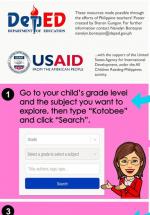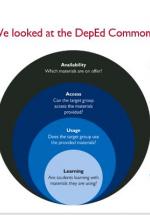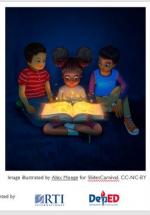Philippines
Country Code:
PHL
MEL Framework for Technology Supported Remote Teacher Training

This MEL Framework for Technology-Supported Remote Training seeks to help education program implementers, governments, and program evaluators more effectively design, implement, and learn lessons from remote training activities. It places special consideration on the unique characteristics of technology-supported interventions in the global South.
The framework presents minimum standards for the evaluation
of technology-supported remote training, which, in turn, facilitates the development of an actionable evidence base for replication and scale-up. Rather than “just another theoretical framework” developed from a purely academic angle, or a framework stemming from a one-off training effort, this framework is based on guiding questions and proposed indicators that have been carefully investigated, tested, and used in five RTI monitoring and research efforts across the global South: Kyrgyz Republic, Liberia, Malawi, the Philippines, and Uganda (Pouezevara et al. 2021). Furthermore, the framework has been reviewed for clarity, practicality, and relevance by several RTI project teams across Africa and Asia.
Online Training on Formative Assessment for Early Language, Literacy, and Numeracy (ELLN) in the Philippines

This report describes findings and lessons learned from an online teacher training course in the Philippines. "Becoming a Learning Detective" is a 5-day online course that focuses on the design and use of formative assessment to improve literacy and numeracy outcomes in Kindergarten to Grade 3 (K–3) classrooms. The emphasis is on classroom-based assessment strategies that are embedded within daily teaching and learning experiences, involving an active partnership between teacher and students. The course brings together asynchronous and synchronous elements, as well as whole group, small group, and individual learning experiences. The course was implemented for the first time among a small cohort of participants across 17 regions in the Philippines. Findings and recommendations of this initial training are being applied toward strengthening the course prior to offering it at a larger scale in the Philippines.

All Children Reading - Philippines: Project Background Brief

ACR–Philippines falls under All Children Reading–Asia, a broader program implemented by RTI International across multiple countries in the Asia Region. The activities directly contribute to USAID’s education goal to improve early grade reading (EGR) skills for 100 million children worldwide. There are two main areas of activity in support of the overall goals and objectives: EGR instruction and assessment in support of mother-tongue based multilingual education (MTB-MLE), and the use of educational technologies to support improved instruction in early grade reading, especially during school closures. Key achievements and activities through July 2021 are summarized in these briefs--one broad and one specific to the COVID-19 response.

Remote Learning in the Philippines During COVID [Briefs Series]

The Remote Learning Study was conducted during the 2020–2021 school year to investigate how mother-tongue-based multilingual education reading instruction proceeded in 20 schools around the country while classrooms were closed. The school head, 2 teachers, and 4 home learning partners from each school in Grades 1 and 3 were interviewed to gain insights on school administration, teaching and learning, and the home environment. Data was collected at three time points—November, March and June—from 20 school heads, 37 teachers of and 79 parents. Not all respondents were available at each time point. No parents were interviewed in November as recruitment was still underway. Children were also asked to fill out a literacy assessment worksheet, but very few parents returned this worksheet at each occasion. These briefs describe essential themes that emerged from this activity. #1 - Strategies for Assisting Home Learning Partners, #2 - Use of Teaching and Learning Materials, #3 - Use of Technology, #4 - Student Engagement Strategies, #5 - Challenges and Solutions to Remote Learning, #6 - School Leadership, #7 - Literacy Instructional Practice.

Reopening Classrooms Interview Series

This playlist was part of a knowledge sharing activity organized by the All Children Reading (ACR) Philippines project regarding countries' experiences re-opening schools on the occasion of the 4th education forum of the Department of Education. This forum is a platform to share updates of major on-going reform initiatives of the Department with development partners including USAID and a venue to inform, deliberate on and coordinate efforts and actions towards quality basic education. Staff of ACR-Philippines interviewed education stakeholders in the Kingdom of Cambodia, the Dominican Republic, Romania, the United Arab Emirates and United States about what happened when they reopened classrooms. Representatives spoke with us about their experiences, including the preparations they have made—what worked and what did not work. They also describe the challenges that they have encountered and how they managed these issues.

Accessing eResources on the DepEd Commons

This infographic describes how to find early literacy resources in multiple languages, which were developed by Philippine teachers with support from the USAID/All Children Reading activity in 2020-2021

DepEd Commons and dissemination of eResources: a SWOT analysis [Presentation]

This presentation was delivered at the 2021 mEducation Alliance Symposium in a panel on the subject of education technologies for basic education in the Philippines.

Developing eResources for Early Literacy and Numeracy [Presentation]

This presentation was delivered at the 2021 mEducation Alliance Symposium in a panel on the subject of education technologies for basic education in the Philippines.

Learning Continuity Innovations

Learning Community Innovations, an Emerging Good Practice Digest. March 2021 Digest No. 1.
Includes parent engagement successes.

Language Complexity in the Philippines [CIES Presentation]

Presentation delivered at CIES.This study attempts to determine whether or not the complexity of the L1 should be a factor in interpreting reading achievement in multilingual contexts, as well as in planning early grade reading teaching and learning materials and curricula in settings with complex languages.

